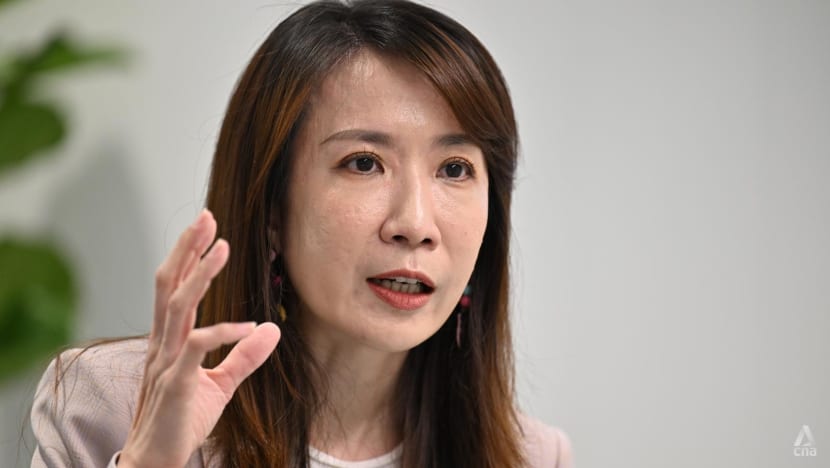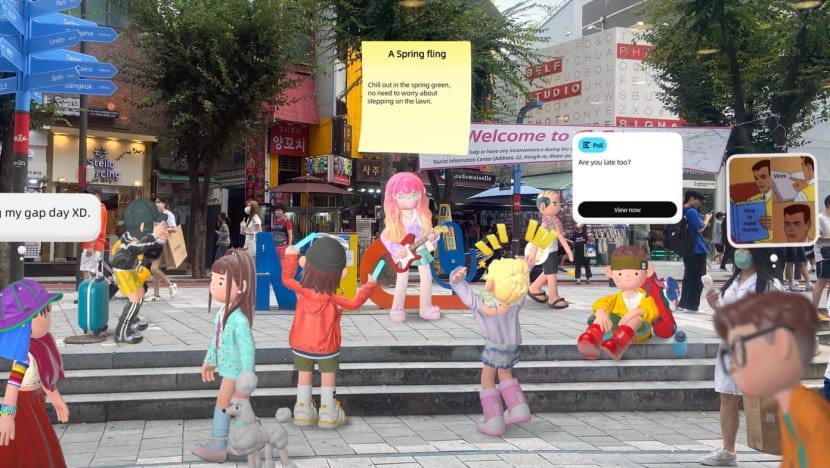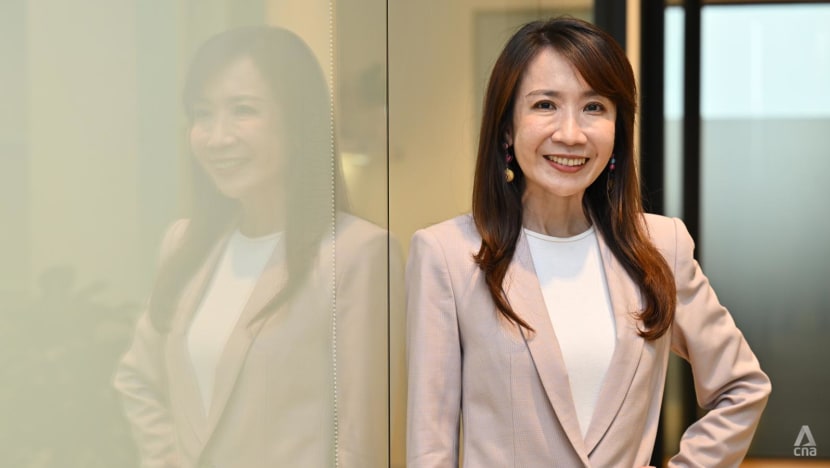Bondee CEO addresses China links as Singapore-based social app relaunches with augmented reality
In an exclusive interview with CNA, Bondee CEO Fei Yu responds to criticism over the company's links to China and rumours of the death of the social networking app.

Bondee's CEO Fei Yu during an interview at Cross Street Exchange in Singapore on Dec 12, 2023. (Photo: CNA/Jeremy Long)

This audio is generated by an AI tool.
SINGAPORE: At the start of the year, Bondee – the social networking app developed by Singapore-based technology start-up Metadream – seemed poised to be the next big thing.
The metaverse app, where users create avatars to hang out and chat with friends, topped charts in app stores across Southeast Asia and Northeast Asia shortly after its debut.
But within days of going viral, things began to turn sour. It started with unsubstantiated rumours about the app leaking users' credit card information.
Metadream roundly rejected the claims, emphasising that Bondee does not collect credit card or other financial data.
Then users started noticing Bondee's resemblance to the defunct Chinese app Zheli, and found government records showing Metadream had registered as a Chinese firm in South Korea, Bloomberg reported.
These perceptions that Bondee had misled users by obscuring its links to China proved harder to shake off, and app downloads reportedly took a hit.
In an exclusive interview with CNA, Bondee's CEO Fei Yu was keen to clarify the company's relationship with China, ahead of a major update to the app.
The launch of a new version of the app with augmented reality (AR) features will be completed across six markets on Friday (Dec 15), after being released in Singapore earlier this week.
Ms Yu, who is from Taiwan, spent 20 years working in technology firms including Meta, Google and Microsoft before joining Bondee in August. She is now based in Singapore.
"Singapore is our home, and I'm actively hiring our leadership team here in Singapore," she said.

In May 2022, Metadream acquired the intellectual property rights of Chinese tech firm True.ly, which developed the app Zheli.
Such acquisitions are "common practice" among technology companies, which acquire organisations with ideas and designs that they value, including those by Chinese developers, said Ms Yu.
As part of the acquisition, True.ly's developers moved over to work on Bondee. Ms Yu believes the association with True.ly was what led to the "wrong perception" about Bondee's ownership.
She also stressed: "We do not provide service – not now and not in the future – in China or to Chinese users. That's not in our plans."
Users' unease over Bondee's Chinese ties cropped up around the same time that TikTok, owned by the Chinese company ByteDance, faced mounting pressure in the United States over perceived national security concerns.
In March, TikTok's Singapore-born CEO Chew Shou Zi was grilled by US lawmakers about data security and user safety on the app, which has over 150 million active users in the United States.
As part of his testimony in the US Congress, Mr Chew pointed out that TikTok is not available in mainland China, and is headquartered in Los Angeles and Singapore.
Asked about any parallels with Bondee's situation, Ms Yu said that TikTok and Douyin (the version of TikTok available in China) have the same parent company in ByteDance, which is based in China.
In contrast, Bondee's parent company Metadream is based in Singapore, making it a "different case", she said.
Metadream is registered locally with an address at Duo Tower in Singapore, according to records from the Accounting and Corporate Regulatory Authority.
Bondee says on its website that it stores user data on servers located in Japan, Singapore and the United States. Earlier this year, media outlets reported off a statement by Amazon Web Services that it powers the app's computing, storage, networks, databases and data analytics.
But Ms Yu declined to reveal the number of employees in Bondee's Singapore headquarters and regional offices, citing a desire to keep hiring flexible. The app is also available in Malaysia, Japan, the Philippines, South Korea, Taiwan and Thailand.
She also declined to reveal app user numbers, telling CNA it would not be a fair indicator as Bondee did not prioritise user growth after its launch, and its user base was "in transition". Its largest markets are in Japan and South Korea.

Bondee is in the process of setting up its permanent office space in Singapore. In August, it appointed senior technology executive Lionel Sim as the head of commercial, and is also hiring in public relations, public policy and finance roles.
In its other markets, the intention is to have functions like customer service, sales and policy served by teams "in a local office speaking a local language, closer to the market and user".
Building trust with Bondee's users is important and will be a "long journey" for the company, said Ms Yu, adding that the early challenges have been a learning experience.
For the next step in that journey, Bondee made a strategic decision to focus on AR and the potential of integrating online and offline spaces, she said.
This takes the form of a new version of Bondee with AR features that is being launched in all existing markets except the Philippines. The app is also being prepared for its first launch in Indonesia.
With the app refresh, users can use their smartphones to make their Bondee avatars appear in and interact with real physical locations, such as by posting virtual notes and holding virtual events.
For example, an avatar leaves a virtual post that resembles a chat bubble or Post-It at a physical location. It will be pinned there for 180 days, and other Bondee users who visit the physical location during that period can see what other avatars are doing or have left behind on the AR interface.
Bondee is now focusing on user growth and user experience, with monetisation less of a priority, said Ms Yu. But it hopes to leverage the AR features for brand and advertising partnerships in time to come, such as by driving foot traffic to a physical retail store through a virtual store on the app.
All this takes place against a mixed prognosis for the metaverse, whose death has been declared at various times by various media outlets this year.
Disney and Microsoft reportedly shut their metaverse units earlier this year, while Meta's metaverse-oriented Reality Labs has bled millions in operating losses. At the same time, Apple is gearing up for the launch of its first mixed-reality headset, priced at a cool US$3,499.
Ms Yu said Bondee believes AR technology can bridge the gap that remains to a metaverse fully realised in virtual reality. AR overcomes some of the challenges of virtual reality, like complicated and expensive equipment, and the mental health effects of being online, she added.
"AR is the combination of the real world and the virtual world, and it actually makes the real world richer," said Ms Yu. "Our mission is to inspire real-world discovery and bring enjoyment through exploration."
As of Thursday, Bondee was ranked 186 on the social networking chart of Apple's App Store, and had been downloaded more than 5 million times on Google Play.



















